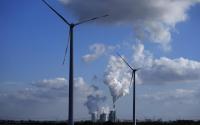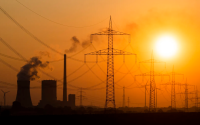7 March 2006Karl Vick
Turkey is reviving its long-deferred quest for nuclear power, pressed both by serious energy shortfalls within its own borders and by strident nuclear ambitions in neighboring Iran that threaten to upset a regional balance of power.
"The rise in oil prices and the need for multiple sources of energy make our need for nuclear energy an utmost priority," Energy Minister Hilmi Guler said last month in announcing plans to build as many as five atomic energy plants. The first, to be located on the Black Sea at Sinop, would come on line in 2012 and ease Turkey's costly dependence on natural gas, 90 percent of which arrives by pipeline from Russia and Iran.
With a rapidly expanding economy, a population of 70 million and scarce petroleum deposits, Turkey appears to be a logical candidate for nuclear power. Guler, who made his remarks while visiting a nuclear plant in Virginia, said the new Turkish reactors could provide about a tenth of the 54,000 megawatts the country expects to need over the next two decades.
"Turkey is a very poor country in respect to power. This has made the country very vulnerable," said Fatih Birol, chief international economist at the energy agency of the Organization for Economic Cooperation and Development, a cooperative of 30 countries that fosters good governance. Birol said that after briefing Turkey's foreign and energy ministers in recent weeks, "I think this government is rather determined to go ahead."
Neighboring Iran's nuclear program, which the United States and other countries have called a cover for developing nuclear weapons, also looms over the revival of Turkey's program, which has had numerous false starts since the early 1960s. Iran and Turkey are almost identical in population and economy and regard each other roughly as equals in a famously combustible region with no dominant power.
"Iran with nuclear production will be the dominant power," said Ozdem Sanberk, a former ambassador to Washington who heads the Turkish Economic and Social Studies research group in Istanbul. "There will be an asymmetrical relationship."
Sanberk has argued recently that Turkey has no choice but to pursue a nuclear program of its own under the nuclear Non-Proliferation Treaty.
"If we want to leave an independent country to our future generations, we do not have the luxury to delay," Sanberk wrote.
U.S. officials are trying to use Turkey's unease over developments in Iran as part of international efforts to persuade Tehran to suspend its nuclear program. Last month, the U.S. ambassador to the International Atomic Energy Agency, Greg Schulte, spent two days in Ankara for what the U.S. Embassy described as "intense dialogue and cooperation" on the Iranian question. Senior officials of Turkey's ruling Justice and Development Party, whose roots in Islam afford some entree with Tehran, lately have turned up the volume. Foreign Minister Abdullah Gul said Turkey was "saddened by Iran's restarting uranium enrichment."
Any Turkish move toward a nuclear weapons program would mark a dramatic departure from long-standing foreign policy and military doctrine. Guided by the slogan of the country's founder, Mustafa Kemal Ataturk, "Peace at home, peace in the world," Turkish diplomats and the powerful general staff have invested heavily in international institutions, deploying troops repeatedly to Afghanistan and ratifying the most stringent additions to the nuclear Non-Proliferation Treaty.
"Turkey's state policy is always: Play the game within the rules," said Mustafa Kibaroglu, a nuclear proliferation expert at Bilkent University in Ankara. But "if Iran goes nuclear, then who knows?"
In the past, Kibaroglu saw merit in a domestic nuclear industry for Turkey. In a recent interview, however, he argued for alternatives, including improvements to the electrical grid, which leaks as much as a quarter of the power it produces.
"I'm not supporting Turkey's nuclear energy program anymore," he said, "because I'm not clear about what the real intention is. Let's put it that way."
http://www.washingtonpost.com/wp-dyn/content/article/2006/03/06/AR2006030601513.html?nav=rss_world






